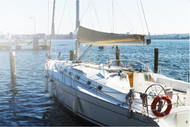Evaluating Cable Quality: What to Look for in Reliable Boat Battery Cables
7th Nov 2023
You're setting sail on a beautiful sunny day, the wind in your hair, the water glistening, and your boat gliding smoothly through the waves. Everything is perfect, except for one thing—the boat battery cables.
They might not be visible, but they do play a critical role in your boating adventure. These unassuming cables are responsible for powering everything from your navigation systems to your fishing electronics, and when they're reliable, you can enjoy a carefree day on the water.
But how do you ensure you have top-quality marine battery cables? We'll provide you with a checklist of factors to consider when choosing high-quality boat battery cables so that you can navigate the waters with confidence.
Cable Material Matters
The first thing to look at when evaluating marine battery cables is the material they are made from. The most reliable marine battery cables are constructed with stranded copper conductors.
Copper is an excellent conductor of electricity and offers high corrosion resistance. This ensures that your cables will have a long life even in the harsh marine environment.
Think of copper as the gold standard in cable materials. It's like having a durable, reliable engine in your boat.

Size and Gauge
The size and gauge of your marine battery cables are critical to their performance. When it comes to boat battery cables, bigger is often better.
The gauge of the cable determines how much current it can carry. You'll want to choose a cable with an appropriate gauge based on your boat's electrical load. Using a cable with too small a gauge can lead to power loss and safety hazards.
Boat battery cables are typically available in a range of gauges, from 16 AWG (American Wire Gauge), a smaller gauge, to 4/0 AWG, a much larger gauge. This variance in gauges allows boat owners to match their electrical load with an appropriate cable size.
Insulation and Protection
The best marine battery cables have robust insulation that protects them from environmental factors like moisture, heat, and UV radiation. Quality insulation ensures that your cables remain reliable and safe for years to come. Look for marine battery cables that are labeled as "marine-grade" or "UV-resistant" to ensure that they are designed to withstand the elements.
Flexibility and Durability
Marine battery cables must be flexible to accommodate the movement and vibrations that boats experience. Cables that are too stiff may break or lose connectivity over time. Look for marine battery cables with a flexible and durable design to ensure they can handle the dynamic environment of boating.
Certification and Standards
When choosing marine battery cables, ensure they meet industry standards. Look for cables that are UL (Underwriters Laboratories) approved. These cables have undergone rigorous testing and adhere to safety and performance standards. UL-approved cables are a mark of quality and reliability.
Environmental Factors and Tips for Weatherproofing Your Marine Cables
Now, marine environments can be harsh, with exposure to saltwater, humidity, and temperature fluctuations. This is why protecting your marine battery cables from these elements is vital for their longevity and performance. Here are some factors to consider:
- Insulation Quality: Opt for marine battery cables with high-quality insulation that's specifically designed to withstand exposure to moisture and UV radiation.
- Heat Shrink Tubing: Applying heat shrink tubing over cable connections can offer an additional layer of protection against moisture and contaminants, reducing the risk of corrosion.
- Proper Sealing: Ensure that cable entry points into your boat's electrical compartments are well-sealed to prevent water ingress. This can be achieved with rubber grommets and cable glands.
- Cable Pathway Management: Maintain a clear and organized pathway for your marine battery cables. Use cable clips and secure pathways to avoid contact with sharp edges or abrasive surfaces that can wear down the cable insulation.
- Regular Inspection: Periodically inspect your marine battery cables for signs of wear, damage, or corrosion. Replace any damaged sections promptly to prevent further degradation.
- Secure Connections: Check cable connectors and terminals regularly. Corrosion and loose connections can lead to voltage drops and electrical issues.
- Overload Protection: Ensure your boat's electrical system has proper overload protection devices like fuses or circuit breakers to prevent excessive current flow in case of a fault.

Navigating Smoothly with Reliable Cables
Remember that your marine battery cables play a vital role in your boat's performance and safety. By evaluating the material, size, insulation, flexibility, and certifications of your cables, you can make an informed decision that ensures a smooth and enjoyable experience on the water.
Don't let unreliable cables sink your plans. Choose high-quality marine battery cables and make your boating adventures more enjoyable and stress-free.
So if you're ready to invest in top-quality boat battery cables that meet all the criteria discussed, we can provide you with the best marine battery cables that ensure safety and reliability here at EWCSwire. With our cables, you can sail with confidence, knowing that the heart of your boat is in excellent shape.

